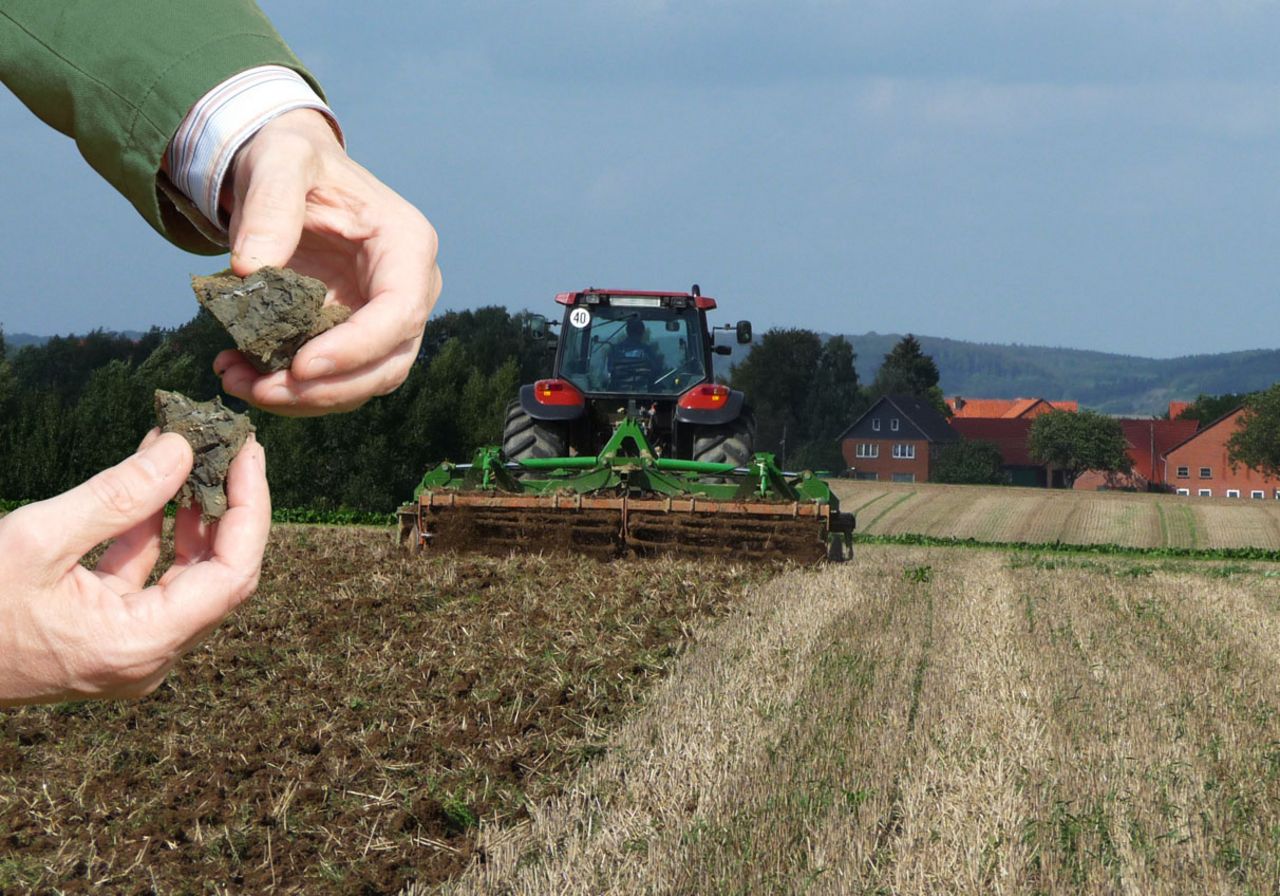Project
SoilMan – Ecological and economic relevance of soil biodiversity in agricultural systems

Ecosystem services driven by the diversity of soil biota – understanding and management in agriculture
The project is part of the BiodivErsA-network SoilMan (Ecosystem services driven by the diversity of soil biota – understanding and management in agriculture). It is focused on ecology and economy of ecosystem services provided by soil biota.
Background and Objective
The project SoilMan is determined to work on a deeper understanding of the interrelationship between farm based soil management practices and soil biodiversity in view of improving soil health and soil fertility. It will provide knowledge on how soil biodiversity in turn feeds back into soil functions and ecosystem services as factors for agricultural productivity and sustainability. It is recognized that soil biodiversity and biota interactions are pivotal for driving soil functions in agricultural systems supporting and regulating ecosystem services directed to agricultural production.
Approach
Via a systematic ecological, economic and political valuation of soil biodiversity in European agricultural systems, soil biota will be placed into a socio-ecological context. In order to better understand how farm-based soil management systems influence soil biodiversity and the sustainable provision of ecosystem goods and services, SoilMan will quantify soil ecosystem functions and multiple ecosystem services based on biodiversity parameters. A large number of state-of-the-art methods and tools in qualitative and quantitative soil ecosystem analysis as well as systematic economic and societal valuation of the services provided by soil biodiversity will be applied. The aim is to derive recommendations for the agriculture sector on sustainable soil management practices making best use of soil biota.
Our Research Questions
The Thünen Institute of Biodiversity conducts field and lab-investigations to assess the impact of soil management practices on the provision of ecosystem services by soil organisms within different biogeographical regions. The scientific work focuses on the repression on economically important fungal plant pathogens and their toxic secondary metabolites (mycotoxins) by soil fauna (earthworms and collembolans).
The Thünen Institute of Market Analysis is responsible for the socio-economic valuation of services provided by soil organisms as well as for the cross-national comparison and policy issues. In order to value the most important goods and services soil biodiversity can provide for farmers and the society as whole and to assess the impact of policy on its provision a modelling approach will be applied. The farm-based model PoMoSoB will be used for the study countries Germany, France, Spain, Sweden and Romania covering five major European biogeographical regions. In addition, the impact of policies on the provision of goods and services that soil biodiversity can provide will be assessed for the European Union including effects on agricultural production and possible impacts on agricultural trade by using selected market models, such as MAGNET or AGMEMOD. It is also foreseen to compare specific regional results – generated in field experiments and through stakeholder meetings – and to link them with the European policies debate in such a way that the results of SoilMan can be useful for policy and decision makers. Policy briefs and stakeholder recommendations of high impact for soil biodiversity will promote the use and application of SoilMan results in policy and practice.
Results
A summary of the project results is given in the Project brief 2021/05a (DOI:10.3220/PB1612357307000): www.thuenen.de/media/publikationen/project_brief/Project_brief_2021_05a.pdf
The findings from the field and laboratory studies (Thünen Institute of Biodiversity) contribute to a better understanding of the complex interrelationships between management, environmental and site factors as well as self-regulation mechanisms in reduced tillage arable systems. They show that the bioregulation of Fusarium by fungivorous soil animals is species-specific and can cover the entire spectrum from suppression to light promotion. With regard to mycotoxins, a significant acceleration of the degradation of all toxins (DON, 3-AcDON, ZEN and FB1) by the key species considered was observed. The reduction rates depend on the respective toxin, the time period, the prevailing temperatures, the soil texture and the key species involved. The earthworm species L. terrestris showed the greatest overall bioregulatory potential, independent of the chaff size in the maize mulch layer. Agricultural management that takes into account the needs and habitat requirements of fungivorous soil animals, and in particular of the species L. terrestris, can thus lead to a synergy in which the interaction of anthropogenic top-down effects (agricultural management) and natural bottom-up effects (bioregulation by soil fauna) contributes to sustainable agricultural production on healthy and fertile soils in the long term.
The Thünen Institute of Market Analysis carried out a socio-economic assessment of the performance of soil organisms and a cross-national comparison. On the basis of an economic model, the effects of increased yield stability through improved soil biodiversity on production, agricultural prices and external agricultural trade were analysed. Policy recommendations were derived from the results. While the significance of ecosystem services on physical yield stability is comprehensively described in the scientific literature, this project worked on extending the economic valuation of soil ecosystem services. For this purpose, an economic model was extended by the physical component of yield stability in order to quantify the economic impact of ecosystem services supported by soil organisms with regard to their yield-stabilising and quality-enhancing effects. By demonstrating the positive effects, not only of the physical, but also of the economic yields of agricultural enterprises, SoilMan was able to build a bridge between the analysis of the physical effects of ecosystem services and their economic effects.
Links and Downloads
Thünen-Contact

Involved Thünen-Partners
Involved external Thünen-Partners
- Georg-August-Universität Göttingen
(Göttingen, Deutschland) -
Swedish University of Agricultural Science - SLU
(Uppsala, Lysekil, Schweden) - University of Tartu
(Tartu, Estland) -
Institut für Angewandte Bodenbiologie GmbH (IFAB)
(Hamburg, Deutschland) -
AGROCAMPUS OUEST - Institut supérieur des sciences agronomiques, agroalimentaires, horticoles et du paysage
(Rennes, Frankreich) -
Institut national de recherche pour l’agriculture, l’alimentation et l’environnement (INRAE)
(Paris, Toulouse, Montpellier, Avignon, Ivry-sur-Seine, Clermont-Ferrand, Rennes, Thiverval-Grignon, Dijon, Orleans, Bordeaux, Pierroton, Frankreich) -
Université de Rennes
(Paimpont, Frankreich) -
University of Agricultural Sciences and Veterinary Medicine
(Cluj-Napoca, Rumänien) - Agencia Estatal Consejo Superior de Investigaciones Científicas (CSIC)
(Madrid, Cordoba, Spanien)
Funding Body
-
Federal Ministry of Education and Research (BMBF)
(national, öffentlich)
Duration
3.2017 - 11.2020
More Information
Project funding number: 01LC1620B
Funding program: EU – ERA-NET BiodivERsA3
Project status:
finished


![[Translate to English:] Logo des Bundesministerium für Ernährung und Landwirtschaft](/media/allgemein/logos/BMEL_Logo.svg)